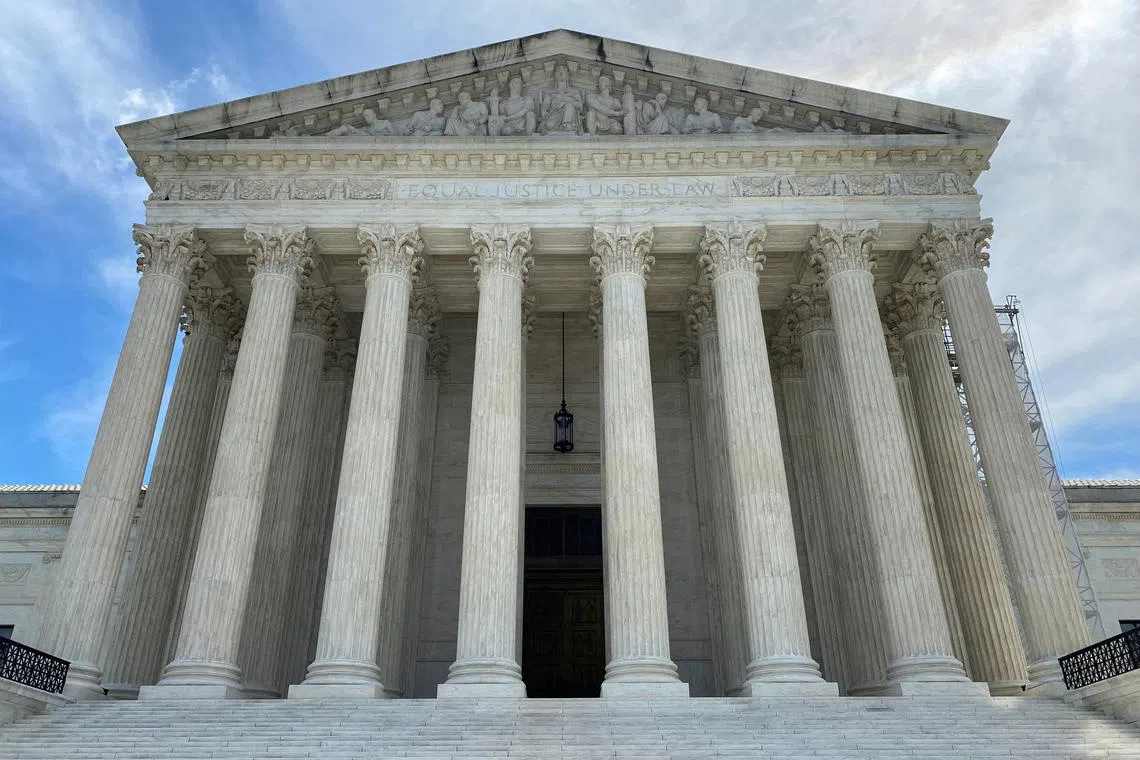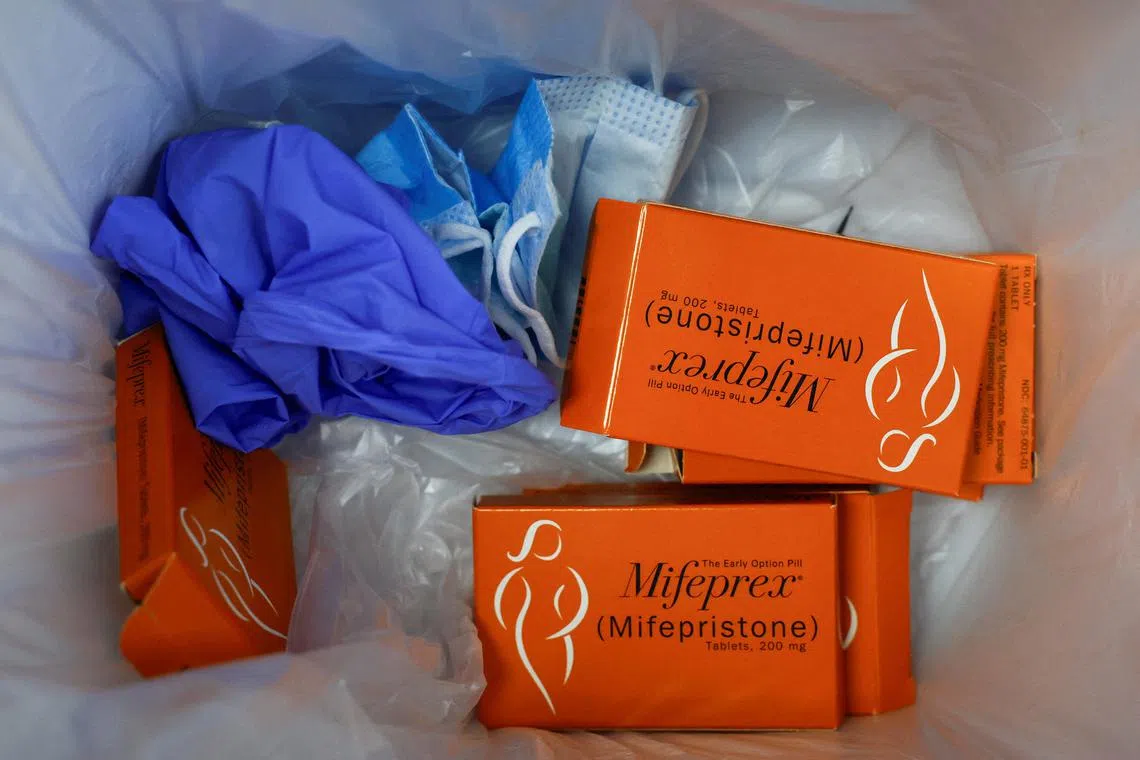US Supreme Court rules against bid to restrict access to abortion pill mifepristone
Sign up now: Get ST's newsletters delivered to your inbox

A ruling in favour of the plaintiffs could have threatened the regulatory authority of the Food and Drug Administration over drug safety.
PHOTO: REUTERS
The US Supreme Court rejected a bid by anti-abortion groups and doctors to restrict access to the abortion pill, handing a victory on June 13 to President Joe Biden’s administration in its efforts to preserve broad access to the drug.
The justices, two years after ending the recognition of a constitutional right to abortion
The pill, given FDA regulatory approval in 2000, is used in more than 60 per cent of US abortions.
The court ruled that the plaintiffs behind the lawsuit challenging mifepristone lacked the necessary legal standing to pursue the case, which required that they show they have been harmed in a way that can be traced to the FDA.
Writing the unanimous decision, conservative Justice Brett Kavanaugh said that even though the plaintiffs do not prescribe or use mifepristone, they want the FDA to make it harder for other doctors to prescribe it and women to receive it.
“Under Article III of the Constitution, a plaintiff’s desire to make a drug less available for others does not establish standing to sue,” Justice Kavanaugh wrote.
A ruling in favour of the plaintiffs could have threatened the regulatory authority of the FDA over drug safety.
The plaintiffs targeted FDA regulatory actions in 2016 and 2021, including allowing for medication abortions at up to 10 weeks of pregnancy instead of seven, and for mail delivery of the drug without a woman first seeing a clinician in-person. The suit initially had sought to reverse FDA approval of mifepristone, but that aspect was rebuffed by a lower court.
The case represents another front in the intensifying battle over abortion rights in the United States. The Supreme Court, which has a 6-3 conservative majority, in 2022 overturned its 1973 Roe v Wade precedent that had legalised abortion nationwide, prompting numerous states to enact Republican-backed measures banning or sharply restricting the procedure.
Mr Biden, seeking a second term in office in the Nov 5 US election, is an outspoken advocate for abortion rights. He and his fellow Democrats have sought to make abortion rights a central theme against Republicans ahead of the election.
Mifepristone is taken with another drug called misoprostol to perform medication abortions. The FDA has said that after decades of use by millions of women in the United States and around the world, mifepristone has proven “extremely safe”, and that studies have demonstrated that “serious adverse events are exceedingly rare”.
The plaintiffs, led by the Alliance for Hippocratic Medicine, argued that the FDA acted contrary to its mandate to ensure medications are safe when it eased the restrictions on mifepristone. The plaintiffs accused the FDA of violating a federal law governing the actions of regulatory agencies.
The plaintiffs sued in Texas in 2022. US District Judge Matthew Kacsmaryk broadly sided with them in a 2023 decision that would have effectively pulled the pill off the market.

Used Mifepristone packages, the first pill in a medical abortion, lie in the trash at Alamo Women’s Clinic in Carbondale, Illinois, on April 9.
PHOTO: REUTERS
After the administration appealed, the New Orleans-based 5th US Circuit Court of Appeals did not go as far as Judge Kacsmaryk but still ruled against the FDA’s decisions in 2016 and 2021 widening access to the pill. The 5th Circuit’s ruling was placed on hold pending the Supreme Court’s review.
In a May Reuters/Ipsos poll, 50 per cent of respondents said they supported an in-person doctor visit requirement for abortion medication, while 33 per cent said they opposed that rule. Seventeen per cent said they were unsure.
Some 57 per cent of respondents in the poll said abortion should be legal in all or most cases, up from 46 per cent in a Reuters/Ipsos polls conducted in 2014. Some 31 per cent of respondents in the latest poll said it should be illegal in most or all cases, down from 43 per cent in 2014 polls. About 10 per cent of respondents consistently say they are not sure.
The Supreme Court heard arguments in the mifepristone case in March.
The case marked the first time any court had second-guessed the FDA’s expertise and judgment to restrict access to an approved drug, according to the Biden administration.
The plaintiffs had argued that they had proper legal standing to sue because their member doctors would be forced to violate their consciences as they would “often be called upon to treat abortion-drug complications” in emergency settings as a result of what they called the FDA’s unlawful actions.
The Justice Department said that these claimed harms relied on an impermissibly speculative chain of events – that other doctors would provide mifepristone to women who then experience a rare emergency and end up in the medical care of these plaintiffs. Nor can the plaintiffs who chose to practise emergency medicine claim to be injured “whenever they are presented with patients in need of care”, it added.
The mifepristone dispute is not the only abortion case the Supreme Court is due to decide during this presidential election year. It also is expected to rule by the end of June on the legality of Idaho’s strict Republican-backed abortion ban that forbids terminating a pregnancy even if necessary to protect the health of a pregnant woman facing a medical emergency. REUTERS


